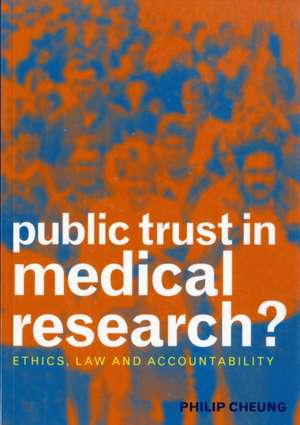Public Trust in Medical Research?: Ethics, Law and Accountability
Autor Philip Cheung, S. H. Leeen Limba Engleză Paperback – 20 mar 2007
Preț: 227.69 lei
Preț vechi: 239.67 lei
-5% Nou
Puncte Express: 342
Preț estimativ în valută:
43.57€ • 45.82$ • 36.00£
43.57€ • 45.82$ • 36.00£
Comandă specială
Livrare economică 26 martie-09 aprilie
Doresc să fiu notificat când acest titlu va fi disponibil:
Se trimite...
Preluare comenzi: 021 569.72.76
Specificații
ISBN-13: 9781846191794
ISBN-10: 1846191793
Pagini: 168
Dimensiuni: 174 x 246 x 14 mm
Greutate: 0.38 kg
Ediția:1
Editura: CRC Press
Colecția CRC Press
Locul publicării:United Kingdom
ISBN-10: 1846191793
Pagini: 168
Dimensiuni: 174 x 246 x 14 mm
Greutate: 0.38 kg
Ediția:1
Editura: CRC Press
Colecția CRC Press
Locul publicării:United Kingdom
Public țintă
Professional Practice & DevelopmentCuprins
Medical progress and human costs. Issues of medical progress. Limits of medicine and medical research. Is medicine going astray? The role of the public. What is good and ethical medicine? The role of ethics in medical research. Ethics and the medical profession. Rules governing medical research. Personal integrity in medical research. Law, medical research and the public. Historical context. Acts of Parliament governing medical education, practice and Research. Public perceptions and law reforms. Non-compliance with the 1961 Human Tissue Act. The Human Tissue Act 1961 was not understood. Organ retention in context. Organ retention in children. Organ retention in adults. Issues of research governance and accountability. Misinterpreting rules of post mortem. Public perceptions of post-mortem examination. Defining hospital-based and coroners' post-mortem. Confusion amongst doctors when putting the law into practice. Certifying and investigating deaths in England, Wales and Northern Ireland - the Shipman Inquiry. Death Certification and investigation in England, Wales and Northern Ireland - the Fundamental Review. Ownership of and respect for the body. The validity of the 'no property in a dead body rule'. Legal implication of the 'no property rule' for the living. Past and present thinking in other EU countries. An insurmountable legal problem. Natural law and medical research. Natural law and its relevance. Violation of natural law. Respect for the dead. To do good in all circumstances. Issues of public trust. Erosion of trust. Negligence. Regaining trust. Ethics and the practice of informed consent. Consent issues - gaps between theory and practice. Improving the validity of consent. The medical profession and the public. Medical paternalism. Does medical paternalism have a place? Empowering the public. The contribution of the voluntary patient groups. The role of the public in the future. Empowering the public. Creating an ethical culture in medical research. Creating an ethical research community. Establishing more effective public control over science and medical research. Training to be ethical. Equitable resource distribution. Promoting public understanding of science and medical research - an innovative strategy.
Descriere
It has been claimed by fertility experts that embryos can be screened for 6,000 diseases, thereby the risk of x-linked diseases can be minimised by 'cherry-picking' male embryos that do not carry the abnormal gene
